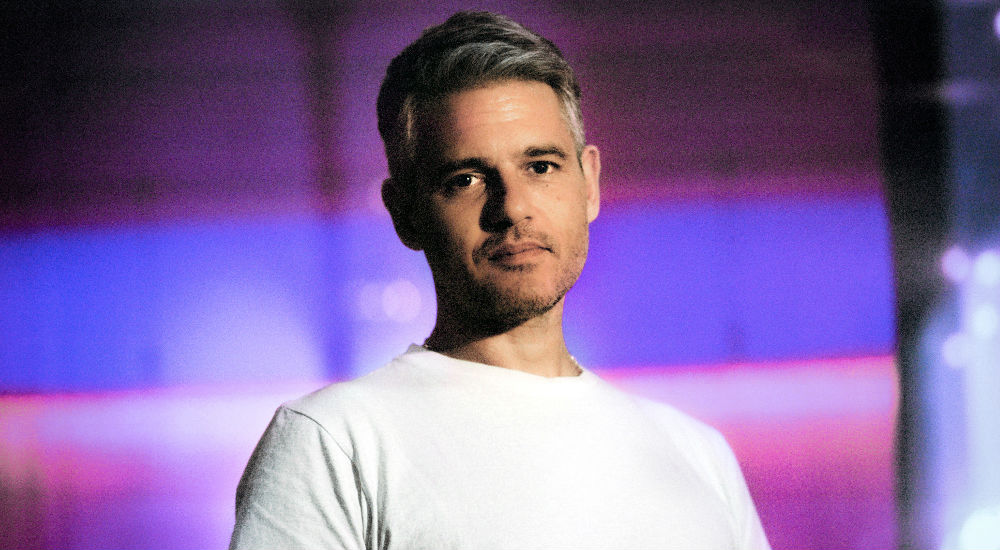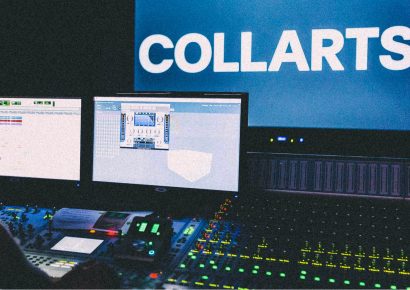Initially achieving critical acclaim in 2005 as the producer behind Bloc Party’s thrilling debut Silent Alarm, Epworth broke into a wholly unprecedented level of stardom when he co-wrote and produced Adele’s smash hit ‘Rolling In The Deep’: an inescapable, yet irresistible slice of pop genius, winning the pair three Grammy Awards and subsequently going eight times platinum in the US alone.
From there, Epworth just kept on churning out the hits. After teaming up with Florence + The Machine for 2011’s Ceremonials and working with the likes of Foster The People and Friendly Fires, Adele called upon Epworth once again to help her pen the theme song for the upcoming James Bond film, Skyfall – which, perhaps unsurprisingly, was another massive success for the duo, charting like crazy all over the world and taking home a gamut of Oscars, Grammys, Brits and Golden Globes for good measure.
Stints producing for Paul McCartney, Coldplay and U2 followed shortly afterwards, and by 2015, it seemed that Paul Epworth had achieved more in ten years as a producer than most had in a lifetime – almost.
“I’d always wanted to be a producer and an artist, as well as an engineer and a musician,” Epworth says from the control room of The Church, a jaw-dropping recording studio in London previously frequented by My Bloody Valentine and Radiohead that he acquired back in 2013. “To me, there aren’t any boundaries between any of those areas. There’s different skill-sets involved and different parts of the brain you use, but it’s all still making music.”
Given his immense profile as producer, it’s amazing that Epworth even managed to find the time to record a solo project, and by the sounds of things, he is too. Pieced together over five years between his other commitments and completed on May 4 of this year – or, as Epworth declares with a grin, ‘International Star Wars Day’ – Voyager acts as the apex of Epworth’s immense career behind the boards. A widescreen, genre-spanning epic inspired by an enduring fascination with science fiction and boasting a track-list that comprises a who’s-who of contemporary talent, Voyager certainly isn’t your typical debut album – but Epworth isn’t your typical producer.
He juxtaposes the husky vocals of Ty Dolla $ign against a backdrop of shimmering synth arpeggios and acoustic guitars on ‘Cosmos’, pairs Lil Silva with legendary rapper Jay Electronica on a slippery jazz-funk instrumental on ‘Love Galaxy’, turns in an absolute eight minute monster of a house banger on ‘Voyager’, and caps it all off with an irresistible slice of space disco on the penultimate jam ‘Space Inc.’ It’s an album that’s as artistically ambitious as it is technically impressive, however, Epworth admits that it’s a miracle Voyager even happened at all.
“I made a version of it that was dreadful,” he says, before quickly backtracking on his words. “Well, it wasn’t dreadful… But it didn’t have any core identity. My musical taste is so broad that it was going from a pop track to a dance track, and then to some psychedelic Pink Floyd thing or some Jai Paul kind of side-chained thing – there was just no cohesion. I had to can it.
“Then, other things happened; I took on the studio and then I had kids, which put things on pause for a bit until there was a two week window where enough stuff came out that I thought was strong enough to pursue it. From there, every little window of time I had in between everything I was working on, I managed to do a little bit more and a little bit more. I never thought I’d get it over the line, but I did it in the end.”
With track titles like ‘Mars + Venus’, ‘Hyperspace’, ‘Love Galaxy’ and ‘Distant Planets’, Epworth certainly doesn’t go about hiding his fervent science fiction obsession across Voyager. The producer would often work on the record while watching classic like 2001: A Space Odyssey on a projector in his studio, and notes that many of the sonic influences on the record can also be traced back to interstellar origins in one way or another.
In addition to the usual suspects – namely Suzanne Ciani, David Bowie, Tangerine Dream and Pink Floyd – and more left-field influences like Flying Lotus’s Brainfeeder imprint and Detroit’s pumping techno scene, Epworth also nods to the likes of Electric Light Orchestra and Parliament-Funkadelic for inspiring him to explore the space concept without hinging too heavily on cosmic cliches.
“The rules were that I could only reference artists who really had some connection to space within their own artistic DNA,” he explains, listing off the artists who made their mark on the project. “There is a cohesive sound that emerged out of that that we were trying to reference, but then of course, you’re doing it in a way that’s also creating a sound for yourself that’s original.
“The other thing about the space concept thing was that you could get artists as diverse as Lianne Le Havas and Vince Staples and, as far apart as they might be lyrically, find a way to bring them into this common thread that felt like it actually connected with me and the music. You’ve got to do that with an album, because otherwise it has no identity – and I’d already made that mistake once before.”
Perhaps another aspect of Voyager’s space-age sound be traced back to the equipment favoured by Epworth over the recording of the album. Although many of the drum sounds on the record were programmed in Logic or Pro Tools, the album is abundant with the sounds of many a classic analogue synthesiser, with booming sub-bass and gleaming modular arpeggios forming a large portion of the record.
During our chat, Epworth shows off a mighty collection of vintage synthesisers and outboard gear kept at The Church, including a massive Moog modular unit, a Roland Jupiter 8 and a pristine Neve recording console, as well his prized Korg 3300: one of the first polyphonic analogue synthesisers ever released into the world.
“We also used an ARP Odyssey a lot, and not just because of the name,” he says wryly. “That’s probably why we ended up with all those Dr. Dre kind of whining leads over the top, although he did it on a Prophet 5.
“I also bought an old Oberheim OBX from the States that arrived halfway through the record wrapped in a single layer of cardboard, and it just sounded so different to everything else, so that made it onto a lot of tracks. But that Odyssey was definitely the main one – if you can get your hands on one of the new Korg ones, they’re a lot of fun to play with.”
On top of the huge number of feature artists who appear across the album, Voyager also plays host to several other songwriters and producers who assisted Epworth over the span of the record, including Unknown Mortal Orchestra’s Ruban Nielson and Glass Animals frontman Dave Bayley, who Epworth has mentored extensively since signing the band to his Wolf Tone label in 2012.
One of the most recognisable contributors to the record, however, comes in the form of the legendary Mike Dean: the weed-loving right hand man for Kanye West and Travis Scott, who lent his expertise as both an instrumentalist and a mix engineer to Epworth to help take Voyager to even higher places.
“Mike’s the kind of guy who’ll smoke an ounce a day, and then go and clone a hard drive manually – if that was me, I’d have one puff and go and delete everything accidentally. That’s Mike’s steeze,” Epworth says with a grin, before piling on the praise for his Texan contemporary.
“We met in the studio when I was working with Madonna and we got to hang out for a bit, and he came to the studio and I showed some of my stuff – it’s a pretty psychedelic record, so you know, it appealed to him. He just said ‘Look, I’m finishing it’, and I said ‘oh God, yes please!’
“I don’t think anybody truly understands what a genius that guy is. We were trying to rehearse some songs the other day to see if we could play the album live; I’ve got one of the best keyboard players in the UK, and he just looked at me baffled trying to play some of Mike Dean’s lines. And that’s not even mentioning the fact that he’s an outstanding mixer and producer – he’s a real technician.”
Despite the bombastic final product that Voyager is, it’s interesting to hear Epworth reflect on the album in retrospect – at points throughout our conversation, he even brings up new ideas behind the project that could have made for a whole new sonic identity altogether. Nevertheless, it’s obvious that it’s Paul’s own intuition and confidence in his counterparts that’s gotten him this far in the music industry, and as he explains, it’s often knowing when to say when that really makes the mark of a true producer.
“Initially, I set out to make an Ableton record; just all in the box, but then at some point through the process, I realised that the record is what it is,” he says. “If production is your art form, then why try undercut it? I thought, ‘if I was Dr. Dre, what the fuck would Dr. Dre do?’ He’s not going to try and make a minimal Jamie xx kind of record – he’s going to make something big and cinematic.You’ve got to know yourself, and I don’t think anyone could have made this record other than me.
“Of course, there’s always going to be a few things towards the end that stick out, and you just have to go ‘fuck it’. I could have obsessed over it for another five years. Would it have been a better record? I don’t know. Would I have missed a window? Probably.
“Sometimes, as a producer when you’re trying to make sure everything sounds great and you’re making sure you’re doing the best for the artist, you do try and go to the ends of the earth to try and make sure that you’ve done the best job you can do within the time available. But then sometimes, when you’ve got infinitely available time, you’ve got know when to put it down.”
Voyager is out now through Sony Music Australia.

